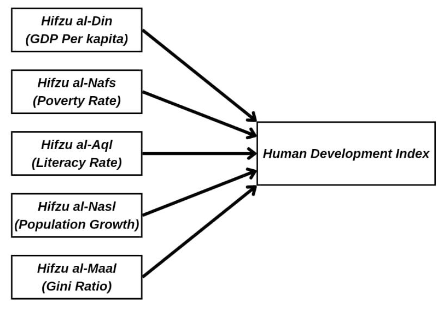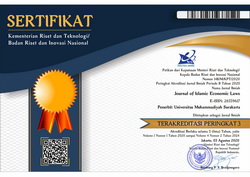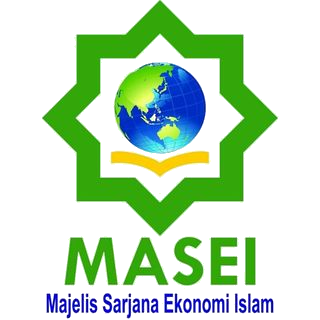The Impact of Maqashid Syariah on the Human Development Index (HDI): The Case of Indonesia
DOI:
https://doi.org/10.23917/jisel.v7i02.6127Keywords:
Human Development Index, Hifzu al-Din, Hifzu al-Nafs, Hifzu al-Aql, Hifzu al-Nasl Hifzu al-MalAbstract
This study investigates how the Maqashid al-Shariah framework, encompassing the protection of religion (Hifzu al-Din), life (Hifzu al-Nafs), intellect (Hifzual-Aql), progeny (Hifzu al-Nasl), and property (Hifzu al-Mal), influences Indonesia's Human Development Index (HDI). This study utilises qualitative research methods and incorporates Eviews-12 software for data analysis, notably using panel data regression techniques with selected Common Effect Model (CEM). The research sample included eight provinces, namely: Papua, West Papua, East Nusa Tenggara, West Sulawesi, West Kalimantan, West Nusa Tenggara, North Maluku, and Gorontalo for the timeframe of 2019-2022. The analysis revealed that protecting religion (Hifzu al-Din) and protecting the mind (Hifzu al-Aql) significantly influence Indonesia's HDI. Interestingly, protecting life (Hifzu al-Nafs), offspring (Hifzu al-Nasl), and property (Hifzu al-Mal) did not show a statistically significant direct impact on HDI in this study. One limitation of the study is the reliance on data from only eight provinces, which may not be representative of the whole territory of Indonesia. The novelty of the research lies in its utilization of the maqashid sharia approach to analyze human development indicators in specific provinces of Indonesia, providing a unique perspective on the factors influencing development in Islamic contexts.
Downloads
References
Al-ayubi, S. (2021). Maqasid Al-Sharia In Islamic Finance. Jurnal Al-Dustur, 4(2), 197–215.
Anisa, F., Dewi, V. S., & Agustina, A. V. (2020). Implementasi Maqasid Syariah Pada Annual Report Bank Umum Syariah Sebagai Mitra Universitas Islami. PROFETIKA, Jurnal Studi Islam, 21(1), 60–67.
Anto, M. H. (2010). Introducing an Islamic Human Development Index (I-HDI) to Measure Development in OIC Countries. Islamic Economic Studies.
Atmojo, D. (2017). Analisi Pengaruh Gini Rasio, Indkes Pembangunan Manusia (Ipm), Dan Jumlah Penduduk Terhadap Tingkat Kemiskinan Di Provinsi Jawa Barat Tahun 2012-2016. Jurnal Ekonomi Universitas Muhammadiyah Yogyakarta.
Auda, J. (2011). A maqāsidī approach to contemporary application of the Sharī’ah. Intellectual Discourse, 19(2), 193–217.
Aydin, N. (2017). Islamic versus conventional human development index : empirical evi- dence from ten Muslim countries. International Journal of Social Economics, 44(12), 1562–1583. https://doi.org/https://doi.org/10.1108/IJSE-03-2016-0091
Badan Pusat Statistik. (2023). Indeks Pembangunan Manusia. Bps.Go.Id. https://www.bps.go.id/subject/26/indeks-pembangunan-manusia.html
Bahtiar, Y., & Hannase, M. (2021). Determinan Indeks Pembangunan Manusia dengan Pendekatan Maqasid Syariah Al-Ghazali. JDEP-Jurnal Dinamika Ekonomi Pembangunan, 4(2), 89–97.
Dalimunthe, A. H., & Imsar. (2023). Pengaruh Kemiskinan , Pertumbuhan Ekonomi , dan Pengeluaran Pemerintah Terhadap Islamic Human Development Index ( I-HdI ) di Indonesia. CAKRAWALA – Repositori IMWI, 6(1), 118–132.
Damodar, G. (2003). Ekometrika Dasar. Jakarta: Erlangga.
Fathur, M., Zuhada, R., & Dharma, B. (2023). Determinan Indeks Pembangunan Manusia Dengan Pendekatan Maqasid Syariah Al Ghazali Di Provinsi Sumatera Utara. SEIKO : Journal of Management & Business, 6(2), 544–554.
Goldameir, N. E., Yolanda, A. M., Adnan, A., Febrianti, L., & Sciences, N. (2021). Classification of the Human Development Index in Indonesia Using the Bootstrap Aggregating Method. Sinkron : Jurnal Dan Penelitian Teknik Informatika, 6(1), 100–106. https://doi.org/https://doi.org/ 10.33395/sinkron.v6i1.11173
Hasbi, M. Z. N., Munajat, M., & Qoyum, A. (2023). Human Development Index from the Islamic Perspective: Roles of Taxation, Zakah, and Health and Education Expenditures. Jurnal Ekonomi Malaysia, 57(1). https://doi.org/10.17576/JEM-2023-5701-08
Herianingrum, S., Muhammad Nafik, H., Fauzi, Q., Afifa, F. U., & Laila, N. (2019). The effect of government expenditure on islamic human development index. Opcion, 35(88), 685–703.
Huda, M., Haryadi, I., Susilo, A., Fajaruddin, A., & Indra, F. S. (2019). Conceptualizing Waqf Insan on i-HDI ( Islamic Human Development Index ) Through Management Maqashid Syariah. Proceedings of the 1st International Conference on Business, Law And Pedagogy, 1–8. https://doi.org/10.4108/eai.13-2-2019.2286206
Human Development Report. (2022). Human Development Report 2021/2022 overview.
Koyimah, I.-, W Mahri, A. J., & Nurasyiah, A. (2020). Analysis Of Human Development With The Islamic Human Development Index (IHDI) In West Java Province In 2014-2018. Review of Islamic Economics and Finance, 3(2), 91–108. https://doi.org/10.17509/rief.v3i2.29381
Lembang, S. T., Kalangi, J. B., & Lapian, A. L. C. P. (2023). Pengaruh Pertumbuhan Ekonomi, Jumlah Penduduk Dan Indeks Pembangunan Manusia Terhadap Kemiskinan Di Kabupaten Tana Toraja. Jurnal Berkala Ilmiah Efisiensi, 23(8), 73–84.
Mursyidah, Wahyuni, W., & Asrida. (2022). Efek Keluhan Kesehatan dan Angka Melek Huruf terhadap Indeks Pembangunan Manusia di Indonesia (The Effect Of Health Complaints And Literacy Rate On The Indonesia’s Human Development Index). Jurnal Pendidikan Ilmu Pengetahuan Sosial, 1(1), 32–37.
Natadipurba. (2016). Ekonomi Islam. PT Mobidelta Indonesia.
Purwanto, E., Miyasto, & Mardani. (2021). Analysis of Islamic Human Development Index Maqashid Syariah Perspective. IJBAM: Indonesian Journal of Business, Accounting and Management, 4(02), 23–27. https://ejournal.stei.ac.id/index.php/IJBAM
Putri, R. M., & Mintaroem, K. (2020). Determinan Islamic Human Development Index (Ihdi) Provinsi Jawa Timur Tahun 2001-2016. Jurnal Ekonomi Syariah Teori Dan Terapan, 6(7), 1410. https://doi.org/10.20473/vol6iss20197pp1410-1420
Rahim, Z. A., Syofyan, S., & Esya, L. (2022). The Influence of The Islamic Human Development Index (I-HDI) on Human Development. UMRAN - International Journal of Islamic and Civilizational Studies, 9(3), 83–103. https://doi.org/10.11113/umran2022.9n3.579
Rama, A., & Yusuf, B. (2019). Construction of Islamic human development index. Journal of King Abdulaziz University, Islamic Economics, 32(1), 43–64. https://doi.org/10.4197/Islec.32-1.3
Ridwan, M., Pagalung, G., Lutfi, M., & Amin, A. R. M. (2023). Maqashid Syariʻah Index Model in Sharia Bank. Bukhori: Kajian Ekonomi Dan Keuangan Islam, 3(1), 29–41. https://doi.org/https://doi.org/10.35912/bukhori.v3i1.2283
Rofiq, N., & Hasbi, M. Z. N. (2022). A New Paradigm In Economy About Maqashid Al-Sharia Theory : Reformulation Of Ibn-Asyur. PAMALI: Pattimura Magister Law Review, 2(1), 77–85. https://doi.org/10.47268/pamali.v2i1.817
Sabar, Z., Hamzah, M. Z., & Basri, Y. Z. (2020). Analisis Dampak Maqashid Syariah Terhadap Indeks Pembangunan Manusia di Pulau Sumatera. Al-Awqaf: Jurnal Wakaf Dan Ekonomi Islam, 10(2), 184–200. https://doi.org/https://doi.org/10.47411/al-awqaf.v10i2.79
Sardini, S., Nasution, M. L. I., & Harahap, R. D. (2023). Determinants Of Human Development Index Using Asy Syatibi’s Maqashid Sharia Approach In North Sumatra Province. Indonesian Interdisciplinary Journal Sharia Economics (IIJSE), 6(3), 1791–1810.
Soemitra, A., Ismal, R., Al-butary, B., Ismail, Arpizal, & Harahap, R. A. (2021). Maqasid Sharia Implementation in Monetary Policy : A Literature Study. El-Amwal: Jurnal Ekonomi Dan Keuangan Syariah, 04(02), 150–165.
Taufikurohman, R., Ekawati, E., & Devi, Y. (2022). Pengaruh Kinerja Maqashid Syariah dan Islamic Social Reporting terhadap Agresivitas Pajak dengan Ukuran Perusahaan sebagai Variabel Moderasi ( Studi Empiris Pada Perbankan Syariah di Indonesia Tahun 2016-2020 ) ( The Effect of Maqashid Sharia Performance . Bukhori: Kajian Ekonomi Dan Keuangan Islam, 1(2), 165–180. https://doi.org/https://doi.org/10.35912/bukhori.v1i2.1792
Todaro, & Smith. (2006). Pembangunan Ekonomi (9th ed.). Erlangga.
Ul Haq, M. (1995). Reflections on Human Development. Oxford University Press.
Verlitya, C. R. (2017). Analisis Zakat Sebagai Pendapatan Asli Daerah Terhadap Indeks Pembangunan Manusia: Pendekatan Data Panel. Jurnal Ekonomi Dan Kebijakan Publik Indonesia, 4(November 2017), 192–211.

Submitted
Accepted
Published
How to Cite
Issue
Section
License
Copyright (c) 2024 Journal of Islamic Economic Laws

This work is licensed under a Creative Commons Attribution-ShareAlike 4.0 International License.



















